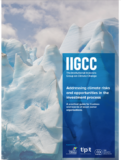Policy makers and regulators across Europe are increasingly acting to ensure pension funds take account of financially-material considerations posed by climate change. Despite the significant changes to regulation already in place or on the horizon, the majority of pension funds have been shown to be unprepared. The Institutional Investors Group on Climate Change (IIGCC) has, in response, produced a comprehensive guide to support pension fund trustees and board members in meeting what is now recognised as a key aspect of fiduciary duty.
The guide – Addressing Climate Risks and Opportunities in the Investment Process – will be launched at an event today, held at the Tate Modern in partnership with HSBC. The event is also part of Green GB Week, celebrating the tenth anniversary of the UK’s ground-breaking Climate Change Act.
In clarifying what is expected of pension funds on climate change, the UK along with the French government has taken a global lead on the issue. In September, the UK Government updated regulation, meaning that pension fund trustees are now duty bound to report on how climate change could impact their investments, and how it is taken into account in the way investments are made and managed.
The guide provides a clear framework to help senior decision makers ensure their organisations are not only meeting regulatory requirements, but also well placed to take advantage of the benefits from investing in low carbon opportunities.
“It simply makes financial sense for pension funds to integrate climate change considerations into the investment process, decision making and dialogue with companies in with they invest,” explains Stephanie Pfeifer, CEO, IIGCC. “Pension funds need to consider how extreme weather events and policy changes to reduce emissions will impact their investment portfolio and their ability to pay out pensions. They should also look for the investment opportunities arising from the energy transition and the shift to a cleaner economy.”
When asked as part of an Environmental Audit Committee enquiry in May 2018, 12 out of 25 of the UK’s largest pension funds explained they had no plans to report on how they are taking climate change into account. The IIGCC is writing to the funds in question to remind them of their duty to do so.
“We want to show asset owners the practical ways to put climate on the agenda and take action. It is a financial concern for investors and, through the guide they now have the tools to address the issue,” adds Meryam Omi, Head of Sustainability and Responsible Investment Strategy, Legal and General Investment Management.
“We’ve reached the point at which both the science and the policy requires more urgent action from trustees to understand how climate change will impact their scheme’s assets and liabilities,” adds Jennifer Anderson, Investment Manager at TPT Retirement Solutions. “That is not a straightforward exercise but acting on climate change is about the investment opportunities it brings as much as it is about understanding the risks and broader regulatory requirements.”
With central bank governors such as Mark Carney highlighting the risk to financial stability posed by climate change, awareness of its significance as a financial issue has grown considerably over recent years. The actions of pension funds are now coming under increasing scrutiny as a result. Lawyers from Client Earth have already written and put 14 UK pension schemes “on notice” of legal action. In an ongoing legal case in Australia, a plaintive is in turn taking his pension company to court for failure to demonstrate how they are addressing the issue.
The FSB’s Task Force on Climate-related Financial Disclosures, led by Mark Carney and Michael Bloomberg, has produced a framework and guidance to support the delivery of consistent climate-related financial risk disclosure. As the emerging industry standard, the IIGCC guide is structured around implementation of this framework.
The IIGCC guide has been produced with the support of TPT, Legal and General Investment Management and the Finance Dialogue.




